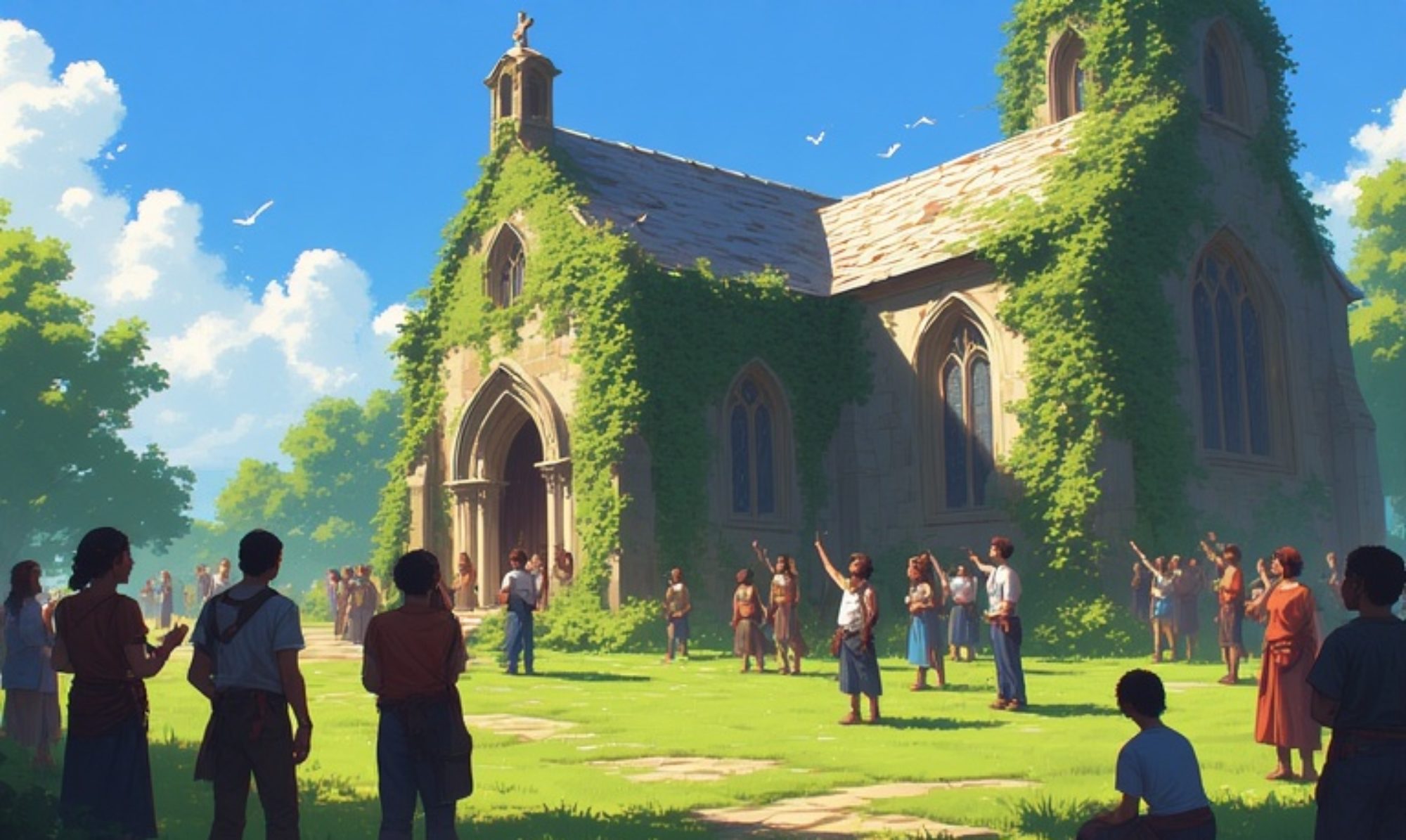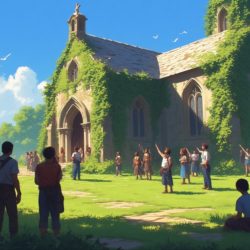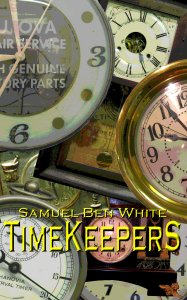When Bat Garrett wakes up one morning with the wrong wife, he knows something is wrong.
Jody’s dead. His grandson Edward is dead. A young woman named Marianne went to the future by herself.
Everything is wrong and Bat is the only person who remembers how things used to be, when they were right. But it’s not just a memory. Bat can see that other life. Bat is caught in a dual reality and most everyone–in both realities–thinks he’s going crazy. But Bat is convinced that only one of the realities is the way things are supposed to be, so he sets out to find out what split reality and do whatever he has to do to make it right. Even if it means teaming up with Garison Fitch.
No, not the Garison who lives in Colorado. The one who lived and died in the 1700s. Bat has to get to that Garison to straighten everything out.
Available now on Kindle (click here to order) and in paperback!
And don’t forget to read the next step in the saga: “TimeKeeperS: Rectification“ and the conclusion “TimeKeeperS: Restoration“.
…
Reading Sample
Garison had taken the man’s hand when it was offered, but now he let it go as if it were on fire. Regaining most of his composure, he peered at the man with rapt interest and asked, “Bat Garrett?”
The man looked nervously at the three women, the one fair and blonde, the one dark and the one with red hair, but all with striking good looks, then said, “We met, um, back when you were coaching baseball at Sul Ross University.”
Garison could not hide his surprise as he repeated vaguely, “Sul Ross?”
“It’s in Alpine,” the newcomer said, by way of explanation. “Texas,” he added.
Garison suddenly slumped back into the large, padded chair behind his desk, muttering, “Alpine.” Then, again, more softly, “Alpine,Texas.”
Helen, rushing to her father’s side in near panic, couldn’t help but ask, ”How could he know, Pop?”
Heather’s lawyerly mind kicked into gear and she confronted the newcomer with, “If I find that you have broken—“
“Broken into the Anglican Church and read the manuscript? Oh, wait, you haven’t left it at the Anglican Church, yet, have you? It’s still in the house somewhere, isn’t it?” As Garison Fitch and his daughters looked at him suspiciously, the man who had introduced himself as Bat Garrett reached into his pocket and produced a coin, flipping it to Garison. As Garison caught it deftly, the man instructed, “Take a look at who’s on that coin. And the year.”
As Helen continued to gaze piercingly at Garison, Heather looked at the coin in her father’s hand and muttered, “That looks like—“
“George,” Garison completed. Then, “1975? That’s the year I was born.”
Helen injected, “He could have read the manuscript and manufactured that.”
“That’s what Heather said you’d say,” the man replied with a smile. Looking at the Heather in the room, he explained, “The other Heather. The one you were named for. So she wanted me to show you this.” He pulled a small picture frame from the leather satchel he carried and passed it across the desk to Garison.
Garison took it suspiciously, almost insolently, but then he saw the picture in the frame and his voice caught with a gasp. He finally managed to say, “Heather.”
The Heather in the room reached out to still her father’s shaking hands and looked at the picture in the frame. She turned her eyes to the newcomer in the room and asked, “That’s Heather? His other—the woman I’m named for?”
Bat hesitated, but not as one who is trying to think of a lie. He finally managed to say, “Yes.”
Helen gently drew the frame from her father’s hands and looked at the picture. In her best lawyerly voice—owing to living in a family of lawyers—which she sometimes affected to keep the emotion out, she asked, “This is what you call a—a photograph, isn’t it?” At her father’s nod, she took a closer look at the picture and said, “She—she looks kind of like Jody, doesn’t she?”
“No she doesn’t,” the newcomer said, then blushed and, shaking his head said, “Oh, you mean the Jody in this room. Yeah, they do kinda favor, don’t they?”
Garison nodded as a low laugh emanated from his chest. “She has from the day she was born. I mean, Jody looked like Heather from the very first.” He looked at his daughter Heather, and told her with a smile, “When your mother suggested we name you Heather, I thought it would be a grand, divine joke if you looked like the Heather of the future. You never did, though. You’ve always been your mother in dark colors. But when Jody was born—I mean, from the day she was born … “
He swiveled his chair and looked out the window for a moment, then shook his head and jumped to his feet. He came around the desk, almost bowling Jody over, and extended his hands, asking warmly, “Bat Garrett? Is it really you?”
The newcomer pulled Garison into hug—which surprised everyone in the room—and said, “I wasn’t sure I could find you. But, all in all, it wasn’t really that hard.”
“You’re kidding.”
“Well, I mean, I guess it was—once you get past the whole time travel thing. Once past that, though, I just had to follow the directions on the old map and they pointed me right here.”
“So where have you been? Anthony said you came by earlier. You could have waited.”
“I know, but, I really wanted to see the eighteenth century.”
“You took an awful risk.”
Bat laughed and assured him, “It’s OK. I didn’t stomp on more than a half-dozen butterflies.”
“Butterflies?” Heather asked. “At this time of year?”
“It’s a reference to—oh, never mind,” said her father. He turned back to Bat and asked, “I’m not sure whether to ask why you’re here or how you’re here.”
“How’s easier to answer,” Bat told him with a smile. “You want to take a walk and I can tell you what I know?—which may not be as much as you would like to know, but I’ll do my best.”
“I’d like that,” Garison replied. Then, “Would you like something to eat?”
Bat hesitated, then told him, “I packed a lunch and ate it just before heading into townbut that sure does smell good. I think I could eat a bite, if you’ve got it to spare.”
“Certainly,” Helen said, fixing Bat some food on the plate she had been using for herself. “Sorry that I only brought four plates.”
“How could you know I would be here?” Bat asked with a chuckle as he took the food. Then, “Thanks.”
Garison leaned close and asked with a smile, “You didn’t happen to bring anyTabascosauce with you, did you?”
“Of course. I always travel with condiments,” Bat told him. Then, at Garison’s hopeful look, added, “I’m kidding.”
“Well, then why come back at all?” Garison chided.
“You know, I always liked you better than the other Garison,” Bat said, gesturing with a steak wrap he had built. “The one in the future’s too serious.”
“Does he look like—like my father?” Heather asked, anxiously, for the first time in her life believing that her father’s story might be true.
“Exactly like.”
“I want so badly to start asking everyone questions,” Bat told him as they walked the dirt streets ofAlexandria. “’Did you fight in the war?’ ‘How’s the Constitution coming?’” He saw a man walk by, followed by another man with dark skin, and added in a low voice, “’How can you possibly think enslaving another human being is an acceptable practice?’”
Garison nodded and said, “I have lived for more than forty years with those thoughts. How to bring indoor plumbing to everyone. To build an internal combustion engine. To end slavery. I’ve talked to George about that quite a good bit. And others. I’ve found a willing ear inAdams. George tells me he will free his slaves upon his death. It’s a start, but,” he was silent as a person whom he knew passed nearby, then added, “It is not enough. I am known as an abolitionist, and I’ve been working on the issue but—but you didn’t come here to talk about that. Why did you come here?”
“Let’s talk about how and that’ll get us to why.”
“Fine. But not here. Not in the open. Let’s go to my house.”
“I guess we could have talked in your office. You being a lawyer, people are probably used to you visiting with weirdoes.”
“Oh, they think I am the weirdest of all,” Garison chuckled. “But mainly, I want you to meet Sarah.”
“I’ve always wanted to. You know: my son married your Sarah. I mean, the Sarah in the future.”
“Is that so? How did I—how did the other me take that?”
“Not good at first.” He slapped Garison on the back and added, “By the time they celebrated their twentieth anniversary, he was pretty much used to it, though.
“Oh, um, will I get to meet Bat? The one you named after me? Thanks, by the way.”
“He is off surveying, in theOhiocountry. He gets back this way when he can, but he’s always had a touch of the wanderlust.” Garison laughed ruefully, “More than a touch. He and Darius—who is his nephew and I’m guessing you may have heard about—have always liked the far lands. Maybe it’s because of all those stories I used to tell them about where I grew up.”
“Kinda wanted to meet him. Henry’s a congressman, isn’t he? And Justin’s in shipping, right?”
“You have done your homework,” Garison complimented. “Justin would prefer to be a woodworker, but his talent along those lines is limited. As we might have said in the twenty-first century, the shipping is done merely to support his woodworking habit.”
“We thought it best that I study up for this. And Jody, she works for you, doesn’t she?”
“She could be one of the finest lawyers in the country. Heather already is. But Heather stays here because her husband works with Justin and she is, at heart, a homebody.”
“And Jody?”
Garison shrugged, then answered, “For all her independence, Jody thinks it is also her job to look after me in all matters.”
“That’s great.”
“And do you have any other children? Besides the one who married Sarah? Did she turn out as pretty as her mother?”
“Prettier, if you can imagine it.”
“I don’t believe I can.”
“We—Jody and I—had two more children, actually. Eryn, she married a minister named Douglas Joens and lives inFlagstaff, near us. Homeschools. I think she looks just like Jody—my Jody—but no one else ever sees it.”
“It’s a father thing,” Garison nodded.
“And then there’s the baby of the family, Lori. She’s married to a fellow named John. He manages a church camp about halfway betweenLa PlataCanyonand Cortez and she just became a junior partner in your—I mean, the other Garison’s—law firm.”
“You don’t say,” Garison beamed with admiration.
“And Sarah—the future Sarah. Did she have kids?” he asked with interest.
“Yes. Gave us three beautiful grandsons. Only sad thing about that is that we all wondered if a daughter of hers would have continued the family looks. But it would have been hard to top Sarah, so maybe she was a good stopping place.”
Garison smiled happily and recalled, “I can still see her playing in the yard when she was a toddler. Did you ever read about the time she saw the little tree?”
They came to a large, frame house on a quiet street. There was a small oak tree growing in the yard. The lawn was manicured, though being autumn the grass was mostly golden with few shoots of green still holding tenaciously to the cooling ground.
“It’s a nice place,” Bat commented, charmed by the antique rusticness of what was, in reality, one of the finest houses in town.
Before Garison could reply, a petite blonde woman stepped out on the porch. With a warm smile, she greeted, “Welcome Bat Garrett.”
Bat stopped in his tracks, then continued up onto the porch and offered his hands, saying, “And you’re Sarah Fitch. How do you know who I am?”
Sarah smiled and, after looking from side to side, told him in a whisper, “Helen called me as soon as you left the office.”
“’Called’?”
Sarah took him by the arm and, leading Bat inside told him, “Garison hasn’t left the eighteenth century completely unsullied.” She whispered, “I believe you call it a radio.”
Turning toward Garison, Bat asked with a forced chuckle, “I really hope you’ve invented toilet paper ‘cause I’m still shuddering from one near experience with what you call a privy earlier this morning.”
“It was one of my very first things,” Garison replied as he followed them into the house.


